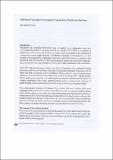PUC Institutional Repository
Non-Party Care-taker Government: Expectations, Reality and Reforms
JavaScript is disabled for your browser. Some features of this site may not work without it.
| dc.contributor.author | Parvez, Md. Shahrier | |
| dc.date.accessioned | 2022-01-04T05:59:43Z | |
| dc.date.available | 2022-01-04T05:59:43Z | |
| dc.date.issued | 2009 | |
| dc.identifier.issn | 2075-650X | |
| dc.identifier.uri | http://digitalarchives.puc.ac.bd:8080/xmlui/handle/123456789/58 | |
| dc.description.abstract | Bangladesh has completed thirty-seven years of journey as an independent state since 1971. Among this period of on-going, the first two decades (1971-1990) of its politics are marked by a series of successful and abortive military coups, movements for the restoration of a democratic system, rigged elections, an ineffective legislature, and omnipotence of chief executives who misused the constitutional institutions and administration to materialize their personal ill wills. After the fall of H.M.Ershad Bangladesh entered into a new era by reintroducing parliamentary form of government in 1991 by the Twelfth Amendment of the Constitution. | en_US |
| dc.language.iso | en_US | en_US |
| dc.publisher | Premier University, Chattogram | en_US |
| dc.relation.ispartofseries | Premier Critical Perspectives;Vol. I (2009), P. 140-146 | |
| dc.title | Non-Party Care-taker Government: Expectations, Reality and Reforms | en_US |
| dc.type | Article | en_US |
